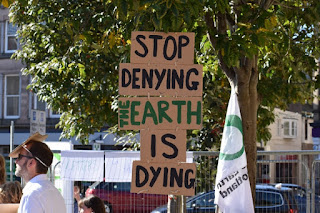 |
| Black Lives Matter protesters tear down statue of slave owner Edward Colston |
Imagine, if you will, a public figure of present day (ish) who is considered to be highly respected or a national treasure. Perhaps David Attenborough, Trevor McDonald, Michael Parkinson, Princess Diana, Bruce Forsyth, Captain Tom Moore, Claire Balding, or Jamie Oliver.
Let's go with Sir David Attenborough: I think he's fantastic and has done so much for conservation, and is well deserving of a plethora of awards. There is a nature reserve here in Nottingham named after him. There's a ship named after him (remember "Boaty McBoatface"?). There are even a few species named after him. I bet there are plenty of other things too - and deservedly so. I think he's a national treasure, but if you don't agree, just insert the name of another all-round good egg in instead of him. As far as I know there are no statues of him, but let's suppose that one is erected, and it is there to celebrate all the great things he's done, and what a great man he is.
Now, suppose it's 150 years from now, in 2171, or thereabouts. The Attenborough Nature Reserve is still there, the HMS Attenborough is a museum ship, his statue is still there, and plenty of other things named after him are still around.
Let us suppose also that laws and social attitudes have moved on, and some things which are commonplace, legal, and generally considered permissible in 2021 are uncommon, illegal, and seen as morally wrong - even abhorrent - in 2171. For example, suppose the age of consent is 24, it's illegal to eat animals, and it's seen as just plain wrong to fly in an aeroplane for tourism or entertainment. I know that David Attenborough eats meat and flies by plane to different places; I'm less sure about his sexual experience, but let's say he has, as most people have, had sex with someone under the age of 24 at some point in his life.
 |
| How will future people view us? Source: Unsplash |
David Attenborough, so respected and revered during his lifetime, and mourned upon his death, is a figure representing beliefs and actions which are 'of his time', and the people of 2171 have no place in their hearts for someone who treated animals and the environment so badly (by eating them and polluting it, in their eyes), and in his sexual attitudes towards minors.
The fact that Attenborough has done a great deal for the environment, and that his views on meat eating and the age of consent are well-aligned with his contemporaries is lost on the people of 2171. They simply say "Eating animals, polluting the environment by air travel, and sex with minors, is wrong today, and it was wrong back then. The fact that many others in society also had the same values as Attenborough does not make it right. The fact that these things were legal does not make it any less morally objectionable." More 'active' activists tear down his statue, and demand that anything named after David Attenborough be renamed after another person with more palatable, less archaic beliefs and actions.
This is an entirely plausible future history, and is remarkably similar to the stories we see today about statues made in the image of particular historical figures, and the buildings, streets, and other things named after such people. Is eating animals and flying in an aeroplane as morally abhorrent as slavery? I don't think it is. But I do not have my beliefs in a vacuum; they are inherently linked to the time period in which I live. If I'd have lived in a different time, I am sure my views would have been coloured by the commonplace those around me.
I don't know much about the men whose statues were torn down earlier this year. Maybe they really were monstrous villains who bought their way into the history books and did no good deeds whatsoever in their lives. Or perhaps, like all of us, they did some good deeds in the world, and others which have not stood the test of time, as the moral tides have rolled onwards. Perhaps - almost certainly - the people who we consider national treasures today will not be quite so treasured by future peoples. In all likelihood, our descendants will see us as immoral and uncivilised, the way we look upon our ancestors who supported slavery, and our descendants will be tearing the statues which we erect today.
We can shrug and say so be it: we in 2021 have a right to tear down the statues of slave owners, just as the people of 2171 have the right to tear down statues of anyone whose views or actions they see as morally wrong. But if we think that the people of 2171 would be misguided to tear down the statue of Sir David Attenborough and vandalise it, then we should probably view the protestors who tore down the Edward Colston statue in the same way.
 |
| Human evolution. Source: Pixabay |